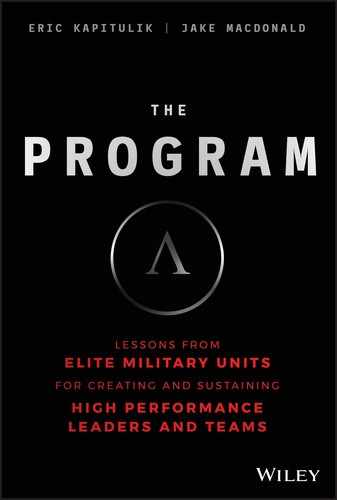30
Leaders Ask “How?”
THE FIRST STANDARD to which a leader is held accountable is to accomplish the mission. In the case of a corporate CEO or Head Coach of an athletic team, they (or their team) determine their mission. More often, as subordinate leaders, we are provided with one. In either case, we then must determine whom in our organization we task, and what those tasks should be (as well as how they “fit together”), for the successful accomplishment of that mission. The leader should involve subordinate leaders when doing so. Involving our teammates allows the subject matter experts to give their valuable input. In the military, our greatest source of intelligence is provided by the troops “on the ground.” Sometimes leaders are more involved with the battle at a “strategic” level rather than a “tactical” one, and they appreciate the input of those with more direct tactical involvement. On the athletic battlefield, players may be able to see certain tendencies or read an opponent’s body language, information that is not readily available to their coach on the sideline. The same is true for corporate team leaders with their subordinate leaders and subject matter experts. However, time, or the situation, may not afford the leader with the opportunity to ask subordinate leaders and teammates for advice or input. When the helicopter was shot down a few hours into the fight for Najaf, Mac didn’t have time to ask his subordinate leaders for their thoughts and suggestions to rescue the downed helicopter crew. He simply commanded them to get “on him,” and “Go. Go. Go.” As long as the senior leader has developed trust with teammates (accomplished in large part by their consistently accomplishing the second standard of a leader; more on this in the next chapter), the team will still strive for success and execute the plan at their 100%. They will be “all in.” However, if time and the situation allow, the best and most successful leaders will involve their teammates in the planning process. As discussed in Section 1, asking for input from our “best” people in determining the team’s standards provides ownership of the team to them. So, too, does soliciting their advice and input during the mission planning process. “What is working?” University of Oregon Offensive Coordinator Scott Frost (now Nebraska head football coach) would ask his star quarterback, Marcus Mariotta, leading up to a game and during halftime. North Texas Head Coach Seth Littrell and Offensive Coordinator Graham Harrell (currently the Offensive Coordinator with the University of Southern California) would ask the same of their star quarterback, Mason Fine, as would Coach Josh Heupel with his own quarterback, McKenzie Milton. Vic Schaefer, the head coach of Mississippi State women’s basketball, asked the same question of point guard Morgan William, as did John Tillman, Maryland men’s lacrosse head coach, to midfielder Isaiah Davis-Allen. And they asked the question regardless of the score—whether the team was winning or losing. These subordinate leaders have all earned that trust. Their coaches know that involving these subordinate leaders in the mission planning process will not only make for a stronger plan, but most importantly, also ensure that their subordinate leaders (and their teammates) commit to it and its execution at their 100%. It helps to ensure that they are also “all in.” They are going to battle with ownership of the mission rather than just being handed a piece of paper and told to “get it done.” The team views the mission, and the plan to successfully accomplish it, as their own. Ownership facilitates these feelings and beliefs. Further, regardless of the battlefield, as any leader will readily admit, a plan is very important, just not as much as it being executed with a violence of action. Ownership helps ensure it. All great leaders ask for assistance from their subordinates in developing a plan to successfully accomplish the mission. Although these aforementioned coaches and players accomplish their missions very often, they don’t always. Although great leaders ask for input from subordinates, they never ask them to be responsible for it. Sometimes Marcus, Mason, or McKenzie throws an interception, Morgan turns the ball over, or Isaiah commits a costly penalty. On the even rarer occasions that their teams lose their battle, failing in the accomplishment of their mission, you will never hear their coach during the postgame press conference say, “Well, it was their idea.” These coaches, military commanders, and all great leaders know that as the leader, they are ultimately responsible for everything that happens or fails to happen in their units. They—not their subordinate leaders whom they asked for assistance—are responsible for their team’s mission accomplishment.
